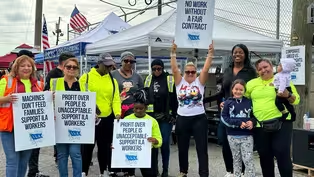NJ Spotlight News
NJ violates solitary confinement law, report says
Clip: 10/3/2024 | 6m 32sVideo has Closed Captions
Inmates say they aren’t allowed out of cells for mandatory four hours a day.
Inmates say they aren’t allowed out of cells for mandatory four hours a day. Advocates want greater oversight
Problems playing video? | Closed Captioning Feedback
Problems playing video? | Closed Captioning Feedback
NJ Spotlight News is a local public television program presented by THIRTEEN PBS
NJ Spotlight News
NJ violates solitary confinement law, report says
Clip: 10/3/2024 | 6m 32sVideo has Closed Captions
Inmates say they aren’t allowed out of cells for mandatory four hours a day. Advocates want greater oversight
Problems playing video? | Closed Captioning Feedback
How to Watch NJ Spotlight News
NJ Spotlight News is available to stream on pbs.org and the free PBS App, available on iPhone, Apple TV, Android TV, Android smartphones, Amazon Fire TV, Amazon Fire Tablet, Roku, Samsung Smart TV, and Vizio.
Providing Support for PBS.org
Learn Moreabout PBS online sponsorshipDonte Hatcher says during his 14 years behind bars, he was routinely locked in his cell for 23 hours a day.
Some days he was only allowed out for 30 minutes to get a shower.
Hatcher was released from prison almost a year ago, and spoke with NJ Spotlight News on behalf of a new scathing report issued by the watchdog group, the NJ Prison Justice Watch, which accuses the state Department of Corrections of violating laws around solitary confinement.
The group surveyed 65 incarcerate aged people and found the vast majority are getting far less than the legally required four hours a day outside their cells.
In fact, many said half an hour was the norm.
Research shows people capped in isolation deal with negative long term consequences like PTSD, self-harm and increased risk of suicide even after their released, inmates like Dante said conditions worsened rather than improved since Governor Murphy signed the updated law in 2019, describing solitary as inhumane and gruesome.
They're not prisoners.
They're not, they're not they're not slaves.
They're not.
They're people.
They're human beings who have made a mistake in their life.
And I suffer the consequences.
Understandable.
Cool.
Nobody's perfect.
We've all done something wrong that don't give anybody else in this world the power to step on my net.
Because, I mean, in the state, the power to beat me just because you had a bad day.
That don't give you that.
So in this report, we're not only asking them to end the torture of solitary confinement, but we're asking them to take accountability.
The journey begins with one step.
But this fight that we're fighting is bigger than isolation.
Confinement.
This is only the beginning.
With us now is our senior writer, Colleen O'Dea, who spoke with Donte for her reporting on the piece.
Colleen, good to see you.
Obviously, some very powerful thoughts from Donte.
What did he share with you personally about what it was like being confined to his cell?
You know, he said that it made him feel less than human.
To not be able to go out, you know, see fresh, you know, breathe fresh air.
To not be able to go out and take a shower every day and make a phone call to a loved one, it felt totally isolating.
It it felt like you were totally alone.
So, he makes a very strong case for why, this should not continue to happen in prisons.
Yeah.
So we know that the report accuses the state of of violating these policies, but what is the policy?
Because new Jersey has an all out put a ban on solitary confinement.
So the and there's some dispute over this.
The isolated confinement restriction law or ICRA which was passed in 2019, says that a person must have at least four hours a day outside of his cell or if a person is being kept in a restrictive environment that's for no more than 20 days in a row or 30 days in a in a two month period.
Now the question comes over the language in the law and whether that applies to every person incarcerated or people in specific circumstances.
One of those is disciplinary circumstances.
The Department of Corrections used to have I mean, they're in the old days, it was called solitary confinement.
It used to be called administrative segregation.
Now they have things called a restorative restorative housing unit to reuse, which are literally used for disciplinary purposes.
But the department is saying that the law does not apply to folks in those circumstances.
So I'm wondering then, I mean, can two things be true at once that they had a different interpretation of the law, and also that these inmates were being held in their cells for too long?
Can those two things be held true at once?
That's a great question.
I mean, if you want to look to kind of an an arbiter, the Ombudsman's office, the Corrections Ombudsman's office last year put out a report that that essentially showed the same thing that it was it was only 4% of people that they surveyed were getting four hours out of cell.
And the ombudsman's office, you know, says that it believes that restorative housing units are used for disciplinary purposes.
But but they haven't gone so far as to say the state is breaking the law.
I mean, it may wind up being something that has to be adjudicated in a court.
So what, if any, action might we see from the legislature, at least?
So we're trying to get in touch with lawmakers who sponsored the law and ask them what they think about this.
You would think that a legislator who wrote a law would be unhappy if it's not being followed.
So we're endeavoring to do that.
You know, the the group is calling on legislature legislative hearings on this.
There's a question as to the appetite in the legislature given just recently, the the both houses have passed a bill that would make that would increase sanctions if you were to assault a police officer, particularly using bodily fluids, which is something that happens, more and more often in prisons.
I mean, Colin, you mentioned the ombudsperson report from last year.
There has been increasing scrutiny around the Department of Corrections.
Is there any talk of just more overhaul in general?
So that's something that, you know, we're constantly hearing discussed, at least from corrections officials from the ombudsman's office.
It seems like these things happen in baby steps.
There haven't been any any widespread, you know, wide scale changes.
I mean, there have been a lot of changes that the the women's prison, the Edna Mahan prison.
But, you know, a lot of the problems that have been identified in those reports are from the larger prisons, particularly new Jersey State Prison, which, as I understand it, has an awful lot of people in these, segregated special units, due to disciplinary issues.
All right.
You can check out Colleen's full reporting on our website, NJ Spotlight News.org.
Colleen O'Dea, thanks so much.
Thanks very much, Bri.
DOJ alleges fraud in Newark’s lead pipe replacement
Video has Closed Captions
Clip: 10/3/2024 | 58s | Construction CEO and vendor arrested and charged with defrauding city (58s)
Free lead testing for children in Camden
Video has Closed Captions
Clip: 10/3/2024 | 4m 36s | Virtua Health plans free screenings throughout October (4m 36s)
Gaudreau family seeks to block release of accident records
Video has Closed Captions
Clip: 10/3/2024 | 1m 10s | Records include 911 calls, camera footage, autopsy reports and more (1m 10s)
Striking dockworkers: Automation will cost jobs
Video has Closed Captions
Clip: 10/3/2024 | 5m 31s | The strike has been suspended until Jan. 15 (5m 31s)
Why are NJ electric bills so high?
Video has Closed Captions
Clip: 10/3/2024 | 3m 45s | Lawmakers press energy experts for answers (3m 45s)
Providing Support for PBS.org
Learn Moreabout PBS online sponsorshipSupport for PBS provided by:
NJ Spotlight News is a local public television program presented by THIRTEEN PBS
















